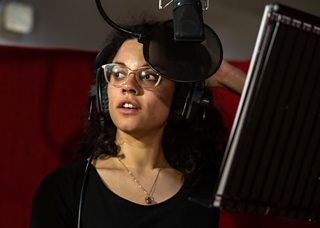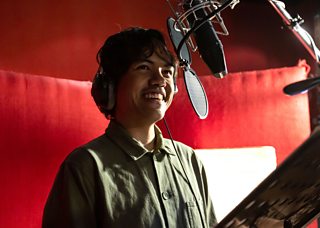U.Me is an international love story staged for radio and podcast which has its world premiere on the ±«Óãtv's World Service on Wednesday 12th May 2021 at 7.45pm via . We caught up with the composer and lyricist Theo Jamieson to find out about the genesis and creation of this innovative and timely work of musical theatre.
Listen to U.Me on Wednesday 12th May at 7.45pm on ±«Óãtv World Service and on ±«Óãtv Sounds
Listen to Everything Stops: The opening track from ‘U.Me: The Musical’
How did you first become involved with U.Me?
Simon Pitts, the show’s creator and a Commissioning Editor for ±«Óãtv World Service, got in touch with me via Twitter. He was looking for a writer for a radio-musical project and he had heard my songs on . What followed was a series of phone calls and emails in which we knocked around ideas and generally got more and more excited about the project’s potential. Simon invited (Culture Club, The Beach Boys) to produce the music and the ±«Óãtv Philharmonic to perform. Very generously they embraced the project.
What was it that appealed to you about the project?
Musicals can gestate for up to 8 years before they reach an audience. Here was an opportunity to create an unabashedly maximalist piece in 7 weeks. On the one hand: lunacy. On the other, these long development periods - though they can precision-tool a show - can also result in a pretty significant estrangement between the authors and their original impulses. This was not a risk here. There were other risks… not this.
The musical forces available on this project were a huge draw. I like the idea of musics as technologies or emotional weapons - symphonic orchestral forces are amazingly powerful, as is a pop rhythm section produced to the hilt. For me, as a composer, it’s the equivalent of getting my hands on giant, somewhat dangerous toys. Tons of fun.
U.Me: The Musical - in production Stephen Fry will be the very special guest narrator along with two young lead actors Anoushka Lucas and Martin Sarreal.
Could you sum up U.Me for the audience in one or two sentences?
U.Me is an hour-long radio musical about a romance between two 20-somethings on opposite sides of the planet. It’s about the act of courage and imagination it takes to form a real connection with someone you’ve never met, and how the isolation of lockdown has in some ways normalised and encouraged this possibility.
Can you introduce the main protagonists?
Rose Darrow is 25 years old, talented and ready. One month before the start of the pandemic she moves to London to embark on her adult life - a life which she’d always dreamed as vivid, vital and varied, a life which - one year in - now consists of working alone in her room and staring at a laptop, while her dream city gathers dust outside, its dial turned to the off position.

Anoushka Lucas plays Rose Darrow in U.Me
Ryo Miike is a 29-year old Japanese-American. Intelligent, curious and with a gnawing sense that he’s chosen the wrong life for himself. Ryo is attempting to course-correct by abruptly abandoning his San Francisco career in web-design and heading to Kyoto to find himself, staying with university friends.

Martin Sarreal plays Ryo Miike in U.Me
How did you develop the storyline and who was involved in that process?
Simon Pitts and I wrote the story together. In early December 2020, Simon came to me with the initial brief, which was: “a radio musical in reaction to the Coronavirus pandemic which would generate joy.” The question then was what kind of joy? Comedy? Thriller? Against-the-odds hero’s tale? Something to make you dance? Something to make you think? We found ourselves writing a romance. Romantic energy was going to be our joy-generator. We were going to write big feelings and let our characters spread out emotionally. We were going to put them through it and bring them out again. It would be this kind of thing.
We spent a month working out who our lead characters and their circles were. These elements suggested themselves quickly and intuitively, and we stirred in our own experiences and the experiences of our friends and family together with what what we were seeing in the news. I started writing the songs on December 28th.
Why do you think this story works in this format - of a musical for radio and podcast?
I meet everything through my ears. Live theatre is thrilling and disturbing to me (in the best way) but I can have an intense experience just listening to music on the tube, relentlessly scrolling back-and-forth on a particular climax or corner-turn in a song. It’s music/sound/lyric that makes me ripple.
For the most part, Musical Theatre recordings serve as a record or evocation of the live experience (though the audio realisation of cast recordings is generally stupendous now), U.Me is different in that the endeavour was to make the audio version of it the ur-form. So all the “staging” and storytelling was to be achieved with music, text and sound. Though this could limit you in some ways it also affords possibilities for more elegantly traversing different styles of storytelling: pure naturalism, flights of fantasy, and subterranean interiority can co-exist much more comfortably in an audio medium. This turned out to be a good fit for our story: our characters live in their bedrooms, their heads, their computers, their imaginations, so cordoning off these zones with the severity and definitiveness of a visual medium didn’t feel as natural as audio, which can describe the queasy-ecstatic blurring of them far more deftly.
Composer Theo Jamieson on writing for U.Me: The Musical
Music or lyrics first?
Same time. I don’t find it useful to separate the streams. The emotional reality of a lyric is changed totally depending on pitch, dynamic, accompaniment - and the notes, the chord-voicings, the rhythmic movement, become vastly different objects depending on the text. These diverse elements are - not to oversimplify it - one thing. The music is not itself without the lyric - the lyric is not itself without the music, and all elements are participating in one single dramatic or energetic impulse. This includes orchestration and production, they are part of one thing. That’s not to say you don’t zoom in on a constituent part - a sequence of rhymes, a melody, a bass-line, a viola bowing, a reverb - but they’re meaningless without the context of each other. They’re one giant multi-form creature. Like Tetsuo at the end of .
Can you explain a bit about your writing process? Apparently you had a pretty punishing daily delivery schedule to meet?
For this project, writing for seven weeks, I had to generate 1.5 minutes of material a day or I was behind. It was both horrifying and sort of refreshing to have it be that stark.
Preview of 'Life in Lockdown' - from U.Me, the ±«Óãtv's new musical
What have you learned on the project?
This project made a vivid case to me for the excitement and value of making a musical fast. It’s easy to forget this when you gaze in awe at the scale of the form, and when you’re familiar with the orthodoxy of how the modern musical is generally midwifed. I don’t want to undermine the long, considered, development-period method which has yielded so many rich and form-defining works, however it wasn’t always this way: time was writers of musicals would write and produce a show a year and if it worked it worked if it didn’t it didn’t, and that method has provided just as many rich and form-defining works. Working in this way makes me hopeful there’s room for both.
Listen to U.Me on the ±«Óãtv World Service and ±«Óãtv Sounds on Wednesday 12th May 2021 at 7.45pm
